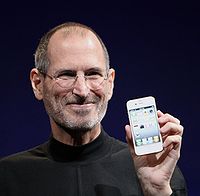STEVE
AUGUST 24, 2011
The meaning of Steve
by Josh Bernoff
I was very sad to hear of the passing of Steve Jobs today (October 5). The world needs more visionaries like this, but there are no others. My thoughts from when he resigned from Apple, in August . . .
So, Steve Jobs is gone — resigned as CEO of Apple.
Consider, for a moment, the meaning of Steve.
By my count, Steve Jobs changed the world five times. Five.
He introduced the Apple II when I was a teenager. Sure, there were Altairs before, but there were no “personal” computers — such a thing was unimaginable. After that, we knew anyone could own a computer. That changed everything.
He introduced the Macintosh when I was working at Software Arts, the company that created the first spreadsheet, VisiCalc. I remember the Mac’s predecessor, the Lisa — we had one in a special room behind a locked door. My 24-year-old mind saw it and boggled — this was a completely different way to use a computer. Mouse, windows, icons, graphical UI — and I saw what happened when children started playing with it and using “Paint.” This would change everything. And it did. Sure, there was Xerox PARC, but it was Steve Jobs that changed everything.
After Jobs left Apple, it went way downhill, eventually under the unimaginative Gil Amelio. I actually wrote a piece about it for Forrester Research, with a heading that read “Wake Up And Smell The Toast.” Toast it would have been, but Jobs came back.
When Apple introduced the iPod, the interface on the hardware was a revelation. Still, the iPod was just another music player until Jobs made iTunes happen. iTunes changed everything. The music industry turned inside out. A new device, microprocessor controlled, caught fire — probably the first really significant one since the game console. Sure, there had been MP3 devices from the likes of Creative, but Steve Jobs changed the world — made us realize what a cool device connected to a cool service could do. He changed the world again.
The iPhone changed the world. It changed the dynamics of the phone industry — it was subsidized, but Apple controlled the interface, not the carriers. It became your real-time, all-the-time portal to the world, in your pocket. The apps, the multi-touch interface — another revelation. It changed the world yet again — now, increasingly, we all have devices like this in our pockets.
The iPad was the fifth change. It’s destroying the PC industry with a new mode of interaction.
(If you want to stretch it, Pixar changed a whole industry, too. Call it five and a half times.)
Nobody else comes close.
Bill Gates changed the world twice — once with DOS, and once with Windows.
Sergei Brin and Larry Page changed it once, with Google.
David Sarnoff once, with color television.
Tim Berners-Lee and then Marc Andreessen once, with the Web and the browser.
Dan Bricklin and Bob Frankston once, with the spreadsheet.
No entrepreneur changes the whole world five times. Not since Edison, at last.
You can admit that Steve is out of all of our leagues. But what is the meaning of Steve? What can we learn?
One. Strategy – see the whole board. The content companies, the carriers, the hardware manufacturers, the engineers, the patents. Jobs saw not just what was possible, but what industries would be affected and how to bully, cajole, sweet-talk,and persuade them into working with him.
Two. Timing. As I mentioned, Jobs, was often not the first. But he saw what technologies were on the verge of being possible — and what technologies consumers were ready to accept. There could have been no iPhone without the habits created by iPods and Blackberry, no Mac without Apple and IBM PCs embraced by those who came before. Timing is crucial.
Three. Supply chain and differentiation. Apple doesn’t make flash memory, microprocessors, touchscreens, or, for the most part, Web sites. It just puts them all together. Profit margin comes from assembling commodities in a fantastic, must-have package.
Four. Design. Apple’s products are the first family of computing devices that tell people about your style. The other ingredient is lots of advertising. Design plus advertising equals lust. Lust is good for an entrepreneur.
Five. Audacity. Imagine the impossible, possible. Persuade with showmanship. Make people believe.
None of us has all of these. But you, reading this, have some of them. You can be audacious and have great timing. You could excel at strategy and design. You can’t be Steve Jobs. But you can learn from him. Work on it.
If you want to change the world, now you know where to start.

